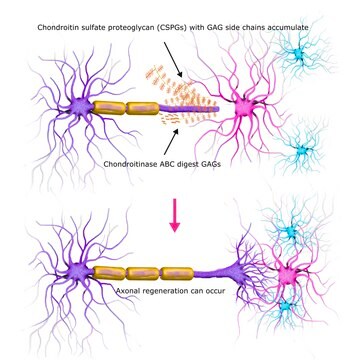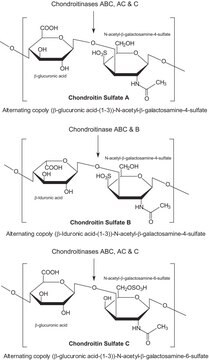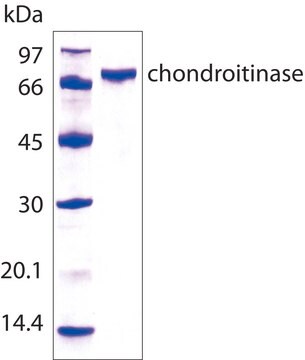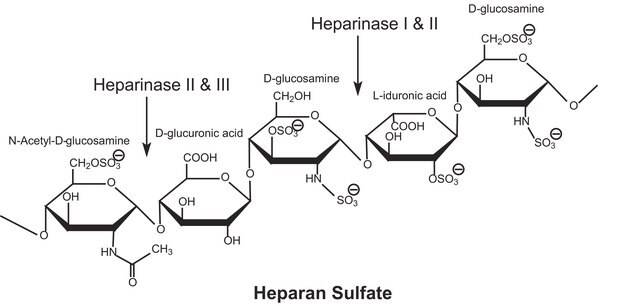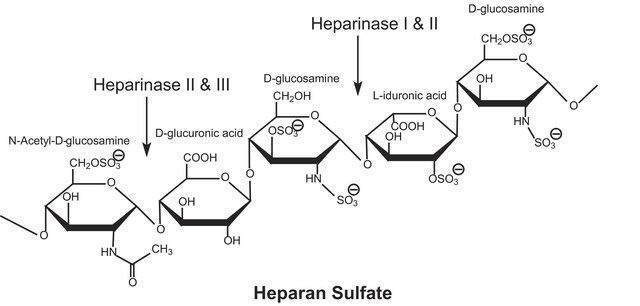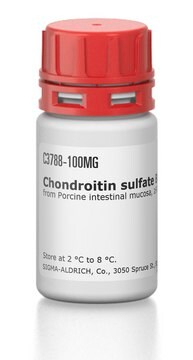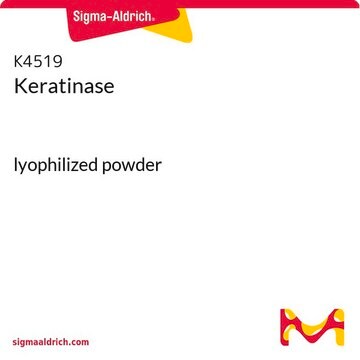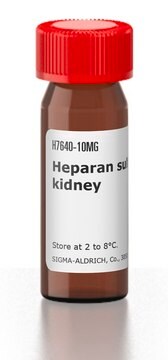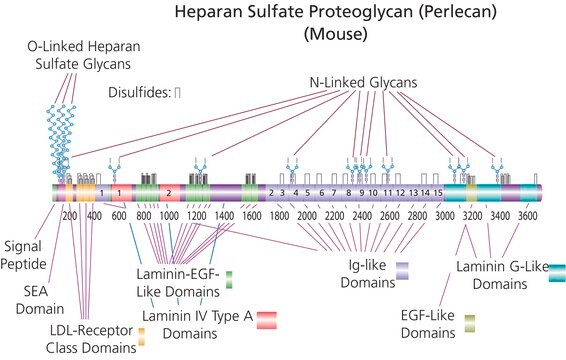C8058
Chondroitinase B from Flavobacterium heparinum
lyophilized powder (with BSA as stabilizer)
Sinonimo/i:
Chondroitin sulfate B lyase
Autenticatiper visualizzare i prezzi riservati alla tua organizzazione & contrattuali
About This Item
Prodotti consigliati
Origine biologica
bacterial (Flavobacterium heparinum)
Livello qualitativo
Coniugato
(Glucosaminoglycan)
Stato
lyophilized powder (with BSA as stabilizer)
Condizioni di spedizione
dry ice
Temperatura di conservazione
−20°C
Applicazioni
Chondroitinase B from Flavobacterium heparinum has been used in a study to assess the structural characterization and antithrombin activity of dermatan sulfate. Chondroitinase B from Flavobacterium heparinum has also been used in a study to investigate the chondroitin lyase action pattern via liquid chromatography–mass spectrometry.
The enzyme from Sigma has been used for the analysis of the frequency of iduronic acid in dermatan sulfate dodecasaccharide. It has also been used to digest dermatan sufate (DS) in melanoma cells. This digestion resulted in decreased proliferation and invasiveness of tumor cells, thereby suggesting a role for DS in metastasis.
Azioni biochim/fisiol
Chondroitinase B degrades only chondroitin sulphate B producing oligo- and tetra-saccharides, and an unsaturated 4-sulphated disaccharide. It has an optimum temperature of 20 °C and an optimum pH of 8.0. The enzyme activity is inhibited by 50% using 0.1 M NaCI. Co2+, Fe3+ and Ba2+ also inhibit its activity.
Definizione di unità
One unit will form 0.1 μmole of unsaturated uronic acid per hr at pH 7.5 at 25°C using chondroitin sulfate B as substrate.
Avvertenze
Warning
Indicazioni di pericolo
Consigli di prudenza
Classi di pericolo
Eye Irrit. 2
Codice della classe di stoccaggio
13 - Non Combustible Solids
Classe di pericolosità dell'acqua (WGK)
WGK 3
Punto d’infiammabilità (°F)
Not applicable
Punto d’infiammabilità (°C)
Not applicable
Dispositivi di protezione individuale
Eyeshields, Gloves, type N95 (US)
Scegli una delle versioni più recenti:
Possiedi già questo prodotto?
I documenti relativi ai prodotti acquistati recentemente sono disponibili nell’Archivio dei documenti.
I clienti hanno visto anche
Gerdy B ten Dam et al.
The American journal of pathology, 171(4), 1324-1333 (2007-08-25)
Chondroitin sulfate (CS) is abundantly present in the tumor stroma, and tumor-specific CS modifications might be potential targets to influence tumor development. We applied the phage display technology to select antibodies that identify these tumor-specific CS modifications. Antibody GD3G7 was
Y M Michelacci et al.
The Biochemical journal, 151(1), 121-129 (1975-10-01)
A chondroitinase that degrades only chondroitin sulphate B was isolated from Flavobacterium heparinum, and separated from a constitutive chondroitinase AC also present in extracts of F. heparinum. The enzyme acts only on chondroitin sulphate B, producing oligo- and tetra-saccharides, plus
Zhenqing Zhang et al.
Analytical biochemistry, 385(1), 57-64 (2008-11-11)
Liquid chromatography-mass spectrometry was applied to determine the action pattern of different chondroitin lyases. Two commercial enzymes, chondroitinase ABC (Proteus vulgaris) and chondroitinase ACII (Arthrobacter aurescens), having action patterns previously determined by viscosimetry and gel electrophoresis were first examined. Next
Nicola Volpi et al.
Glycobiology, 19(4), 356-367 (2008-12-06)
Glycosaminoglycans from the body of marine clam Scapharca inaequivalvis were extracted at about 0.15- 0.18 mg/g of dry tissue, composed of dermatan sulfate (DS) (approx. 74%) and heparan sulfate (26%). After treatment with nitrous acid, DS was isolated for further
Yvette M Coulson-Thomas et al.
Journal of neuroscience methods, 171(1), 19-29 (2008-04-18)
Injury to the CNS of vertebrates leads to the formation of a glial scar and production of inhibitory molecules, including chondroitin sulphate proteoglycans. Various studies suggest that the sugar component of the proteoglycan is responsible for the inhibitory role of
Articoli
Glycosaminoglycans are large linear polysaccharides constructed of repeating disaccharide units.
Il team dei nostri ricercatori vanta grande esperienza in tutte le aree della ricerca quali Life Science, scienza dei materiali, sintesi chimica, cromatografia, discipline analitiche, ecc..
Contatta l'Assistenza Tecnica.
